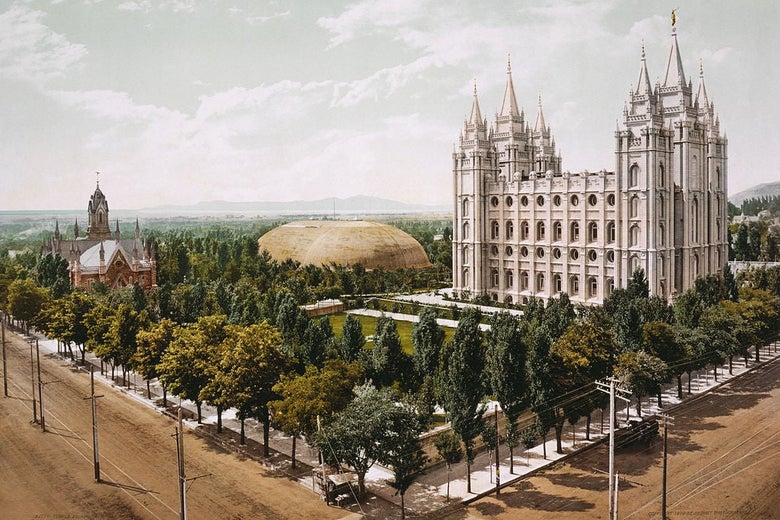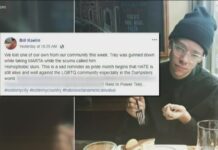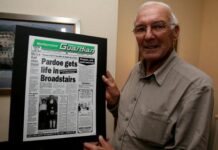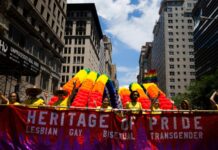
On Aug. 23, Jeffrey R. Holland, Brigham Young University’s former president and a senior apostle in the Church of Jesus Christ of Latter Day Saints, gave an inflammatory speech to BYU faculty and staff. In it, he urged faculty to take up metaphorical muskets to defend the faith. He called on them to be both builders of knowledge and defenders of the institution—the church—that determines whether the university exists and the faculty get funding to do their jobs, a fact he reminded them of multiple times in the speech. His words were unmistakably a call to arms: Holland used the word “fire” 10 times, “musket” eight times, and made multiple references to “friendly fire,” “wounds,” and “scarring.” In particular, he called for “more musket fire” from BYU’s faculty to defend Mormonism’s official position on the inferiority and social dangers of same-sex relationships and marriages.
Advertisement
Advertisement
Advertisement
Advertisement
Though the speech was directed at the faculty of BYU, it has shocked Mormons and ex-Mormons far beyond the university in its aggressive tone toward the LGBT community. Just two years ago, the church received much public praise for rescinding a 2015 policy, controversial among Mormons at the time, that declared the minor children of gay people could not be baptized into or join the church as members—at least not until they were 18 years old, and only then if they would denounce their parents’ marriage and condemn their sexuality. Given how contentious the question of gay rights has been among Mormons since the church threw its whole weight behind California’s anti-gay-marriage Proposition 8 in 2008, the post-2019 period has been one of welcome relative quiet from the church. That is, until Monday.
Advertisement
I’ve spent my whole life dodging Mormon “bullets” aimed toward non-traditional families. I have Mormon pioneer blood in every one of my eight great grandparents’ lines on my family tree. I grew up in a mostly inactive but still technically Mormon family (my parents and I had all been blessed and baptized into the Mormon church as kids, but we attended services only sporadically). Now, after 15 years living out of state, I’ve recently given Utah another chance. I came back in 2020, with my wife in tow, and we’ve settled here with the intention of someday having our own kids. I took the relatively positive, pro-LGBT developments of the past few years as encouraging signs we were making the right decision. In the 18 months since we moved here from Washington, D.C., Holland’s speech was the first time I truly worried that my future kids might attend public school with peers who would be taught about the evils of being gay, week in and week out at church. Just like I did.
Advertisement
Advertisement
Advertisement
Back then, I assumed the strict ideas of what counted as “doing family correctly” that I heard about endlessly from my church leaders and community must reside somewhere ancient and important, like the Book of Mormon. Not until I was an adult in college did I learn that Mormonism’s supposedly eternal and unchanging doctrine on the family had been penned and publicized for the first time in 1995, when I was eight years old.
“The Family: A Proclamation to the World” was introduced by then-Church President Gordon B. Hinckley, who told Mormons it was meant to “warn and forewarn” about the dangers of the world’s “shifting values.” But the proclamation served a secondary legal role as the church planned its offensive against gay rights. The church included the proclamation as evidence of its doctrinal commitment to a heterosexual family in its amicus brief against gay marriage in Hawaii just two years later. It would continue to cite it throughout its decades-long fight against same-sex marriages.
Advertisement
Framed posters of the 605-word text of the proclamation hung from the family room or dining room walls of almost all my friends’ houses throughout my hometown. Payson is a small town in central Utah, settled by one of my Mormon ancestors at the behest of Brigham Young himself in 1850, and most famous for being featured in the 1984 film Footloose as Beaumont, a fictional town in which religious zealots have banned dancing in the name of God. I’d catch myself reading the text on my friends’ walls from time to time while we studied together or took a break from hanging out.
Advertisement
“We, the First Presidency and the Council of the Twelve Apostles of The Church of Jesus Christ of Latter-day Saints,” the proclamation begins, “solemnly proclaim that marriage between a man and a woman is ordained of God and that the family is central to the Creator’s plan for the eternal destiny of His children.”
Advertisement
Advertisement
The proclamation goes on to describe the basics of modern Mormon doctrine on the family: gender and gender roles are eternal, marriage is between a man and a woman. Sex, or “procreative powers,” are only for married men and their wives (no gay sex under any circumstances). Getting married and having kids are essential to making it to heaven. Men are to “preside over their family”; women are responsible for child-rearing. Confusingly, they are to do all this as “equal partners.” Getting this right was the price of salvation and of entry to the eternities.
A few times, reading the proclamation on the wall at a friend’s house or stuck, bored, waiting in some church classroom, I’d make it all the way to the end, where things got scarier.
Advertisement
We warn that individuals who violate covenants of chastity, who abuse spouse or offspring, or who fail to fulfill family responsibilities will one day stand accountable before God. Further, we warn that the disintegration of the family will bring upon individuals, communities, and nations the calamities foretold by ancient and modern prophets.
Advertisement
Long before I had any inkling I was attracted to women, I felt both accused and convicted by the proclamation. My parents hadn’t married in the temple and weren’t particularly concerned about our chastity. My dad did not preside over the family in faith. He was a non-believer, who, much to my childhood shame, drank beer. And as I got older, I realized I had no intention of accepting child-rearing as my main responsibility as an adult, and that I might even be experiencing some of that same-sex attraction myself. The threat of damnation felt as real and immediate as the threat of being sent to the principal’s office. I remember returning home from a days-long “girls’ camp” put on by the church and sobbing to my mom about our family’s eternal fate.
Advertisement
Advertisement
When I read Holland’s BYU speech, and the reactions to it, I realized I’m not the only one who has changed and grown. Mormonism is now facing a world in which not only the majority of outsiders, but also a significant portion of their own membership—including its own university’s faculty—seem to recognize that doctrine for what it is: a list of propositions phrased as irrefutable truths, issued by a group of men who grew up with homophobia suffusing every institution in their lives.
Advertisement
Advertisement
Holland cited as his inspiration for the speech a couple of anonymous letters from concerned believers who have been watching the rise of LGBT acceptance at BYU. “You should know,” Holland read ominously from a letter sent by one faithful informant, “that some people in the extended community are feeling abandoned and betrayed by BYU.” The letter accused faculty of publicly contradicting Mormon gospel with their LGBT support, and warned that some faithful Mormon parents wonder whether it is even worthwhile to send their children to BYU, rather than some other school.
Advertisement
Holland’s targets weren’t just limited to the faculty. He singled out one openly gay BYU alum in particular, former valedictorian Matt Easton, who came out as gay in his 2019 commencement speech. In simply identifying himself as gay in the course of the speech, Holland alleged, Easton had “commandeered” the 2019 ceremony. Holland asked the faculty Monday, “What might another speaker feel free to announce the next year, until eventually anything goes? What might commencement come to mean—or not mean—if we push individual license over institutional dignity for very long?”
Holland’s 39-minute speech was a gauntlet thrown in an ongoing power struggle between the Mormon apostles who hold the purse strings at BYU and the administrators and faculty who must carry out their policies. In recent years, perceived rifts have emerged between BYU’s president Kevin Worthen and his faculty and administrators, and its board, headed by the president or prophet of the Mormon Church and his apostles.
Advertisement
Advertisement
Advertisement
Holland’s speech confirmed some of those rifts with BYU faculty. Some have become outspoken advocates for LGBT rights, waved pride flags, or marched in pride parades. Some supported a largely symbolic pro-LGBT gesture this spring, in which the normally white, large letter “Y” on the face of the mountain in the backdrop of BYU’s campus in was lit up in rainbow colors this spring. (Holland in his speech made pointed reference to his nostalgia for seeing the “white Y” on the mountain as a boy.) And, clearly, the faculty’s approval of Matt Easton’s commencement speech has not been forgotten by the powers that be.
As the Salt Lake Tribune reported, the speech felt to some faculty members like an unsettling attack on basic principles of intellectual freedom and independence, “exactly the opposite of the norms of academic inquiry that most universities operate under,” as one BYU alum working in higher education, Michael Austin, wrote on Facebook. Holland’s warnings to faculty also doubled as a warning to a growing and increasingly vocal movement of progressive Mormons. Others have noted a possible third audience, since the choice of metaphors—violent throughout—seemed to function as dog whistles to the currently discontented alt-right of Mormondom.
Advertisement
Advertisement
But the ultimate confirmation of a rift came Monday. The same day Holland issued his revanchist address to the faculty, BYU’s administration was opening and publicizing its new Office of Belonging, a long-sought-for refuge not only for BYU’s growing number of openly gay students, but also its religious and racial minorities, who are reported to face widespread bias and prejudice on campus, according to a report issued by an internal Committee on Race, Equity, and Belonging.
Prior to launching the anti-LGBT section of his talk Monday, Holland assured the audience of his love “for those who live with this same-sex challenge.” “Too often,” he went on, “the world has been unkind, in many instances crushingly cruel, to these our brothers and sisters.” Holland described how straight Mormons have wept with these brothers and sisters. Here, Holland’s voice broke as he spoke about how scarred those straight Mormons are from giving that support.
Advertisement
Advertisement
But the truth is much darker. At BYU, some of the cruelest technologies have been used to attempt to end the gay scourge. Halls on the very same campus were once dedicated to electric shock therapy and other experimental treatments, now recognized as inhumane and torturous, intended to change the sexual orientations of BYU students through at least the 1970s. When physical torture proved not to work and declined in popularity, Mormons shifted to conversion therapy. Still, today, the church funnels members who confess to feeling “same-sex attraction” into support groups that encourage members to enter heterosexual marriages, with promises that the gay feelings will be overcome after sufficient faithfulness, or at least, death.
Advertisement
Matt Easton has cited the widely publicized 2016 death by suicide of one of his classmates at BYU, Harry Fisher, as part of the reason for his decision to come out as gay in his valedictorian speech. Due to Mormon teachings that there is no way to have romantic relationships with those of the same sex and be exalted in the afterlife, gay Mormons face high rates of loneliness, suicidality, and depression.
Advertisement
“Crushingly cruel,” Holland said.
As a teenager, I remember riding in the back seat of the car of a Mormon youth leader as she drove us to southern Utah for a service trip. We’d been singing a Queen song on the road, and I’d mentioned a sad piece of trivia I’d learned from my parents—that the lead singer, Freddy Mercury, had died of AIDS. I was shocked to hear the leader scoff and answer back sarcastically, “Oh, isn’t that sad.” Startled, I sought out eye contact with her in the rearview mirror. She locked eyes with me, and she smiled, as if we were sharing a secret. After all, hadn’t the brethren warned us about what would befall those who didn’t obey?
Advertisement
Advertisement
Advertisement
Advertisement
For years, I’ve tried to move on with my life after Mormonism, to truly become post-Mormon. And, in many ways, I have. I’ve moved away, studied feminism, come out as bisexual, fallen in love with a woman. I built a career researching and writing about families—all kinds of families, families of blood, love, and choice, as I often say. I have forged my own path and made a hard break with my religion of origin. Despite all that, the Mormon church and its idea of the family has remained ever-present. Wherever I’ve gone, the proclamation has been in the back of my mind, first as a warning, later as a reminder of all I have broken with.
Advertisement
Holland’s speech signaled that Mormon headquarters may not be giving up its fight against families like mine. Holland indicated that as long as he is alive, the church and BYU would stick to its principles, even if it costs the school “professional associations and certifications.” (BYU’s positions on gender and sexuality are not only unpopular, but may also place the university outside Title IX compliance, a prerequisite for federal funding.)
But this week was also strangely reassuring. The proclamation is losing—to science, to public policy, to the reality of gender’s fluidity and LGBT families’ basic normalcy, goodness, and obvious happiness. If anything, Holland’s violent rhetoric last week broadcast not the church’s strength, but its ultimate weakness—the flimsiness of truths about the family it has claimed to be eternal, central, and steadfast.
At least now others see it, too: The cruelty is coming from inside our house.








